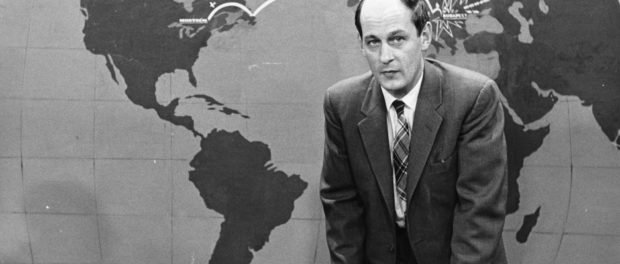1952: Radio-Canada and the Young Lévesque & Other Quebec Curios
Part of “Shadows and Revolution”, 1900-1960
 René Lévesque during his days as a host for "Point de mire". Photo credit: Radio-Canada/André Le Coz
René Lévesque during his days as a host for "Point de mire". Photo credit: Radio-Canada/André Le Coz
September 1952 marked a leap in Canadian media: Radio-Canada marked its first television broadcast. Its English counterpart, the CBC, broadcasting days after Radio-Canada’s historic transmission. Television, as a technology, started production for domestic consumption in Canada in 1948, and by 1952, 146 000 Canadian households were equipped with this new item, about 7000 of which were located in Montréal.
Radio-Canada, as the name suggests, was much more than a television station. Starting in the beginning of the 1920s as a news outlet in radio to counter the Americanisation of media. Seen as a way to protect Canadian culture and to broadcast Canadian content, the country’s national news outlet was one of the main sources of information during World War II.
By 1955, 66% of the Canadian population had access to CBC/Radio-Canada in their household. The price of a television, however, was steep, costing as much as about 800$ in the money of the day, equivalent to about 8000$ today. Initially, televisions were mandated to have only the CBC/Radio-Canada, but this changed by the beginning of the next decade with the arrival of CTV in 1961. By the mid-1960s, more than 90% of Canadian households owned a television, largely due in part to prices dropping with each new advance in technology. Shows broadcasted by Radio-Canada such as the soap opera La famille Plouffe were popular with people of all ages, whereas children enjoyed puppet shows such as Pépinot et Capucine. Radio-Canada’s broadcasting allowed French-Canadians to watch television in their native language (and for English-Canadians to perhaps brush up on their French). In the early hours of the morning, stations would go off-air; broadcasting was not the 24-hour television that modern audiences are used to today.
Radio-Canada’s launch into television required people to host their shows. They hired a young René Lévesque, a radio broadcaster whose voice was known around the world. A witness to the horrors of World War II, Lévesque was suspicious of Duplessis’ nationalism as he was on the scene as Nazi nationalism turned to barbarism. His show on Radio-Canada, Point de mire, was an educational series. With Lévesque’s sharp mind and analysis, he and his show were fan favourites for Radio-Canada’s audiences. Towards the end of the 1950s, the Diefenbaker government’s non-action following CBC/Radio-Canada’s demands to form a union spurred Lévesque into politics.
Despite Premier Maurice Duplessis’ conservatism, he was not at all against the idea of television: in fact, he found a way to get this new technology to align with his mission to create more provincial autonomy. As far back as 1945, he was more than happy to give funding to create Télé-Québec, Québec’s answer to CBC/Radio-Canada, at its core a federal creature. Télé-Québec, however, could not compete with Radio-Canada, and the project was scrapped until the 1970s, when Télé-Québec would be able to receive enough funding to make its first broadcast.
Watch Maurice Duplessis giving a speech here and René Lévesque talk about Algeria during his Radio-Canada times here.





